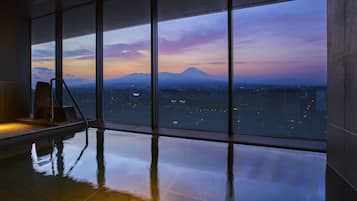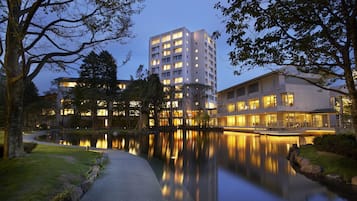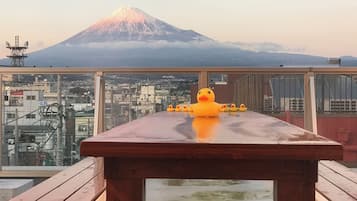The best things to do in Fujinomiya range from exploring majestic Mount Fuji and interesting geological features to visiting local shrines, temples and museums. The city, located between Tokyo and Kyoto, sets on the southwestern slopes of the mysterious and often snow-capped mountain. At 3,776 meters tall, Mount Fuji is the highest peak in Japan. It's an active volcano that rests on a "triple junction" of tectonic force.
Mount Fuji has shaped Japan, not only by its presence, but also culturally and spiritually. This is especially evident in Fujinomiya, the city nearest to the mountain and the gateway to the most iconic tourist destination in all of Japan.
What are the best things to do in Fujinomiya?
- 1
The Kiseki Museum of World Stones
Home of earthly wonders and mineralogical miracles

- Families
- History
The Kiseki Museum of World Stones is a great place to discover unique rocks, fossils, and minerals in Fujinomiya
, just 15 minutes from downtown Fujinomiya.
A local group would gather and show the unique stones they found in the region. The members called themselves the “Kiseki Society '' in the spirit of sharing their wondrous finds. Kiseki means marvel or wonder in Japanese. In 1971 the museum was established to share these natural wonders with the public.
The collection of 17,000 unusual stones on display here are grouped according to themes and are always exhibited from the viewpoint of “Kiseki,” which focuses on the stone’s best features. There is also a Museum Shop and a Gem House where you can search for hidden gemstones.
Location: 3670 Yamamiya, Fujinomiya, Shizuoka 418-0111, Japan
Open: Thursday–Tuesday from 9 am to 4.30 pm (closed on Wednesdays)
Phone: +81 (0)544-58-3830
Mapphoto by Narusawan-98 (CC BY-SA 4.0) modified
- 2
Fujinomiya Trail & 5th Station
The shortest route to summit of Mount Fuji

- Adventure
- Budget
- Food
The Fujinomiya 5th Station is the trailhead for the shortest route to the top of Mount Fuji. The Fujinomiya Trail is at 2,400 metres above sea level – ascending to the summit takes between 4 and 7 hours, while descending takes around 2 to 6 hours. If you time it right, you can see the sunrise from the top of Mount Fuji. You also have views of 8 other peaks, Tokyo and the Pacific Ocean.
The 5th Station has parking, a store for provisions, a restaurant, and restrooms. There are many stops along the trail for supplies, but costs often skyrocket at the higher elevations.
Location: Kitayama, Fujinomiya, Shizuoka 418-0112, Japan
Phone: +81 (0)55-931-3261
Mapphoto by jenterri (CC BY-SA 3.0) modified
- 3
Taisekiji Temple
Beautiful gardens and tranquil temples in the foothills of Mount Fuji

- Budget
- History
- Photo
Taisekiji is the main temple for the Nichiren Shoshu Buddhist sect. Pilgrims and believers from all over the world come here to seek an audience with the Dai Gohonzon, a venerated object of Buddhist worship. The temple gardens and grounds are open to the public, but access to religious buildings is restricted.
The vast grounds are simply gorgeous, with peaceful gardens, ornate outdoor sculptures, and many historically significant structures. Mount Fuji stands sentinel in the background, while the tatchu sando (pilgrimage path) is lined with ancient weeping cherry trees that bloom in the spring.
Location: 2057 Kamijo, Fujinomiya, Shizuoka Prefecture, Japan
Open: Monday–Tuesday and Saturday from 9 am to 4 pm, Sunday from 1 pm to 4 pm (closed
Mapphoto by 三知庵主人 (CC BY-SA 3.0) modified
- 4
Shira-Ito Waterfall
Mesmerising waterfalls in a serene setting

- Adventure
- Budget
- Couples
- Families
- Photo
The Shira-Ito Waterfall is often noted as “the most beautiful falls” in all of Japan. Shira-ito means white thread and refers to the white waters that gently cascade over the cliffs to the pool below. At its base, these falls are so expansive that it's quite a challenge to take a picture of the entire formation without panoramic mode.
The Shira-Ito Waterfall is around 150 metres wide and 20 metres high. It's unique in that its source is underground water from Mount Fuji, and they have a constant year-round flow of 1.5 tonnes per second. Besides a close-up look from below, you can also observe the falls entirely from a nearby hill, which gives you a view of Mount Fuji on a clear day.
Location: 273-1 Kamiide, Fujinomiya, Shizuoka 418-0103, Japan
Phone: +81 544-22-1155
Map - 5
Sengen Shrine Okumiya
Buddhist temple high above the clouds

- Budget
- History
- Photo
Sengen Shrine Okumiya is one of 2 temples located high above the island of Japan. At 3,776 meters high, it's a place of quiet reflection and peaceful contemplation before beginning your journey back down the mountain.
In June, the Natsuyama Summer Festival takes place at Sengen Shrine Okumiya. A procession of over 2,000 participants with torches trek for the safety of all climbers. Between July and August, a shrine priest offers prayers for those making the journey to Mount Fuji.
Location: Kitayama, Fujinomiya, Shizuoka 418-0112, Japan
Open: Daily from 5 am to 5 pm
Map - 6
Obimmizu
Relax at a hidden pond off the beaten path

- Adventure
- Photo
Obimmizu has a serene and spiritual ambience – many visitors take the time to sit and listen to the soothing sound of spring water that gently flows into the small grotto-like pond.
Legend has it that the great Yoritomo, a fearsome samurai and the first shogun of the Kamakura Shogunate of Japan (1147- 1199), stopped by this pond and sought solace in this tranquil setting. Obimmizu is just a short walk from the beautiful Shira-Ito Waterfall.
Location: 273-1 Kamiide, Fujinomiya, Shizuoka 418-0103, Japan
Phone: +81 544-22-1155
Map - 7
Waketamaike Springs
Soothing springs for the soul

- Adventure
- Families
The Waketamaike Springs lie within the grounds of a shrine in Fujinomiya. Also called the Gushing Jewels Pond, it has been designated one of Japan’s many national treasures. The waters of the springs are considered sacred – in ancient times, climbers of Mount Fuji would purify themselves here before their ascent of the mountain.
The Waketamaike Springs and surrounding area offer a sense of well-being and peace. Here, a mizuya (water temple) sits on a rock that denotes the source of the spring that flows from Kantate Knoll.
Location: 1-1 Miyacho, Fujinomiya, Shizuoka 418-0067, Japan
Open: Daily from 6 am to 7 pm
Phone: +81 (0)544-27-2002
Map - 8
Mt. Fuji World Heritage Centre, Shizuoka
A reflective artistic exhibition honouring Mount Fuji

- Families
- History
The Mt. Fuji World Heritage Centre imparts the importance of protecting and preserving the past, present and future of Japan's highest peak. The centre, inaugurated in 2017, is an excellent educational experience about the iconic mountain.
The museum offers an immersive sensory adventure, with part of the main structure designed to look like the mountain's inverted shape. The bulding reflects in the mirror-like pool surrounding its base. Inside, you can explore interactive exhibits about the history of Mount Fuji. A walkable spiralling slope leads to an observation deck with panoramic views of the surrounding landscape and the majestic mountain.
Location: 5-12 Miyacho, Fujinomiya, Shizuoka 418-0067, Japan
Open: Daily from 9 am to 5 pm
Phone: +81 (0)544-21-3776
Mapphoto by Mr.Asylum (CC BY-SA 4.0) modified
- 9
Lake Tanuki
Experience magical views of Mt. Fuji on a lovely lake

- Adventure
- Budget
- Couples
- Photo
Lake Tanuki, located close to Fujinomiya, is a popular spot for fishing, hiking, picnicking, and camping. You can enjoy a panoramic view of Mount Fuji – on calm days, the reflection on the water is simply spectacular. Visit in autumn to see colourful fall leaves and a snow-capped Mt. Fuji in the background.
The lake is also where you can see a unique natural phenomenon called the “Double Diamond.” Twice annually, the sunrise and sunset align perfectly with the top of Mount Fuji. You can see this reflected in the lake when the conditions are right, creating a glorious double diamond effect.
Location: Inokashira, Fujinomiya 418-0108 Shizuoka, Japan
Phone: +81 (0)544-52-0155
Map - 10
Fujisan Hongu Sengen Taisha Shrine
The original starting point for the pilgrimage to the top of Mt. Fuji

- Budget
- History
- Photo
The Fujisan Hongu Sengen Taisha Shrine was originally built over 1,000 years ago to protect against Mount Fuji's volcanic eruptions. The sacred site is also the traditional starting point for pilgrims climbing the mountain summit. The temple remains an important place of worship, as it's the main shrine for around 1,300 Sengen and Asama shrines all across Japan.
The Fujisan Sengen Shrine has great historical, cultural, and spiritual significance in Fujinomiya. Many festivals, celebrations, and ceremonies are held among the ornate temples and religious structures. The grounds are also home to 500 cherry trees that blossom from late March through April.
Location: 1-1 Miya-chō, Fujinomiya, Shizuoka, 418-0067 Japan
Open: Daily from 5 am to 8 pm
Phone: +81 (0)544-27-2002
Map



















